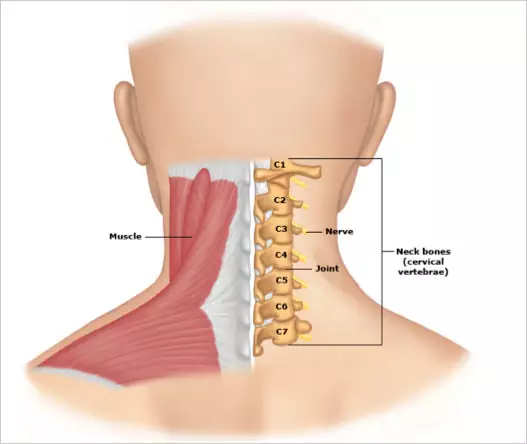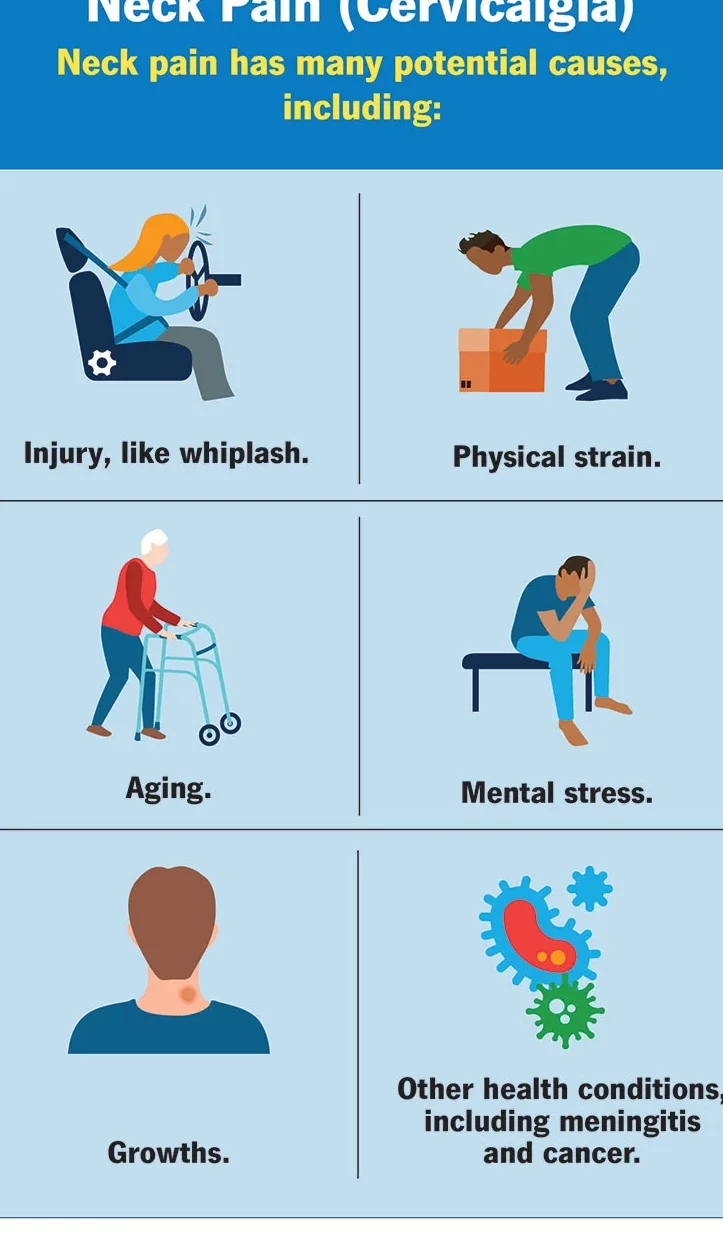What can cause neck pain?
Neck pain happens when there is a problem with or injury to any of the parts (“structures”) of the neck. The structures in the neck include:

●Bones – The neck has 7 bones that are stacked on top of each other. These bones make up the top part of the spine and are called the “cervical vertebrae.” Neck pain can happen when the bones get worn down or develop abnormal growths (called “spurs”).
●Ligaments – Ligaments are strong tissues that connect bones to other bones. Ligament damage can happen when the neck moves back and forth suddenly (called “whiplash”), such as in a car accident.
●Discs – Discs are cushions that sit between the bones. When the discs change shape or move out of position, people can have symptoms.
●Muscles – Muscles hold the head up and make the neck move. Neck pain can be caused by muscle strain or tension, such as from poor posture or stress.
●Nerves – A large bundle of nerves (called “the spinal cord”) travels down the middle of the spine. Nerves branch off from the spinal cord to all parts of the body. People can have symptoms if their nerves are irritated or pushed on by nearby bones or discs.
What symptoms can people with neck pain have?
People can have different symptoms that include:
●Pain, stiffness, or tightness in the neck, shoulders, upper back, or arms
●Headaches
●Neck weakness
●Being unable to move or turn the neck
●Pain when turning or tilting the head
●Numbness or strange feelings (such as pins and needles) in the shoulders or arms
●Trouble walking or moving the legs
●Having no control over the bladder or bowels
Should I see a doctor ?
You should see a doctor if you have:
●A severe injury to your head or neck
●Severe pain
●Numbness or weakness in your arms or legs
●No control over your bladder or bowels
●Pain that doesn’t get better after you treat it at home for 1 week
Do I need to have tests?
Most people do not need any tests. Doctor will perform an exam. They will feel your bones and muscles, check how your head and neck move, and might check the strength and reflexes in your arms.
But some people might need tests. Tests can include:
●X-ray, CT scan, MRI scan, or other imaging tests – Imaging tests create pictures of the inside of the body.
●Muscle or nerve tests to see if the muscles and nerves work normally
What are the possible reasons to develope neck pain?
- Aging: Parts of your cervical spine may degrade or degenerate as you age due to normal wear and tear, which can be painful. Neck pain can be brought on by degenerative disorders including osteoarthritis (the thinning of joint cartilage) and spinal stenosis (the narrowing of the gaps in your spine). Stress and repetitive motions over time can deteriorate the discs in your spine, leading to a herniated disc or pinched nerve.
- Physical strain: During repetitive or demanding activities, overusing your neck muscles can cause stiffness and soreness. Your spine’s alignment can be impacted by poor posture, weak abdominal muscles, and a greater body weight, which can lead to neck pain. For instance, neck pain is frequently brought on by repeatedly craning your neck to look at a computer screen.
- Mental stress: Stress can cause your neck muscles to tighten, which can cause stiffness and pain. Many people don’t know they tighten these muscles when they’re nervous or agitated until their neck begins to pain.
- Injury: Neck discomfort can result from trauma and other ailments that harm your muscles, ligaments, discs, vertebral joints, and spinal cord nerve roots. Neck pain is a common complication of whiplash injuries sustained in car accidents.
- Growths: Masses, including tumors, cysts and bone spurs, can put pressure on the nerves in your neck, causing pain.
- Other health conditions: Neck pain is a symptom of many health conditions, including meningitis, rheumatoid arthritis and cancer.

Is there anything I can do on my own to feel better?
Yes. To reduce your symptoms, you can:
●Take a pain-relieving medicine – Examples include acetaminophen or an NSAID such as ibuprofen or naproxen .
●Put ice on the area to reduce pain – You can put a cold gel pack, or a small bag of ice or frozen vegetables, on the area. Do this for 15 minutes at a time, a few times a day. Put a thin towel between the cold object and your skin to prevent skin damage.
●Put heat on the area to reduce pain and stiffness – Take a hot shower or hot bath, or put a hot towel or heating pad (on the “low” setting) on the area. Apply heat for 15 minutes at a time. Don’t use anything too hot that could burn your skin.
●Do neck exercises – Different exercises can stretch the neck, shoulder, and back muscles and help make them stronger. These might involve turning or tilting your head gently, rolling your shoulders, and doing other stretches. Ask your doctor you should do exercises and which ones can help your symptoms.
●Reduce stress – Stress can make pain worse and prevent symptoms from getting better. Try to reduce your stress. Some people find that it helps to try something called “mindfulness-based stress reduction.” This involves going to a group program to practice relaxation and meditation.
●Improve your posture – Try to keep your neck straight in line with your body and avoid hunching forward. When you have to stay in one place, like while working at a desk, it might help to adjust your position often. When you sleep, use pillows to keep your head and neck in line with your body. Try to avoid sleeping on your stomach with your head turned to the side.
What other treatments might I have?
Some people find that acupuncture or massage help relieve pain in the short term.
Your doctor can suggest other treatments if your neck pain doesn’t improve after you treat it at home. For example, they might suggest that you see an exercise expert, called a physical therapist. Or your doctor might suggest other medicines, or an injection of a numbing medicine into your neck.
What treatments are not helpful?
Most doctors do not recommend that people wear neck collars, especially for long periods of time. If you find that a neck collar eases your pain, wear a soft neck collar for less than 3 hours at a time. Wearing a neck collar for too long can make your neck muscles get too weak.
Other treatments that are not helpful include surgery or a treatment that pulls on the head to lengthen the neck (called “cervical traction”).
Can neck pain be prevented?
To help prevent neck pain, you can:
●Use good posture – Hold your head up and keep your shoulders down.
●Avoid sitting in the same position for too long
●Avoid doing work above your head for too long
●Avoid putting weight or pressure on your upper back
●Keep your neck in line with the rest of your body when you sleep
To know more about this condition and discuss treatment options you can book appointment with doctor
- Note –This is a condensed summary of diagnostic, therapeutic, and medication information and is not intended to be exhaustive. It serves as a guide to aid in understanding potential diagnostic and treatment options and should not be considered a complete source of information. It does NOT encompass all details regarding conditions, treatments, medications, side effects, or potential risks that may be relevant to a particular individual. It is not a substitute for professional medical advice, which is based on a doctors assessment of a patient’s unique health status after examining them. To receive comprehensive information about their health, medical queries, and treatment options, including the risks and benefits of medication use, patients should consult a doctor. This information does not guarantee the safety, efficacy, or approval of any treatment or medication for a specific patient.